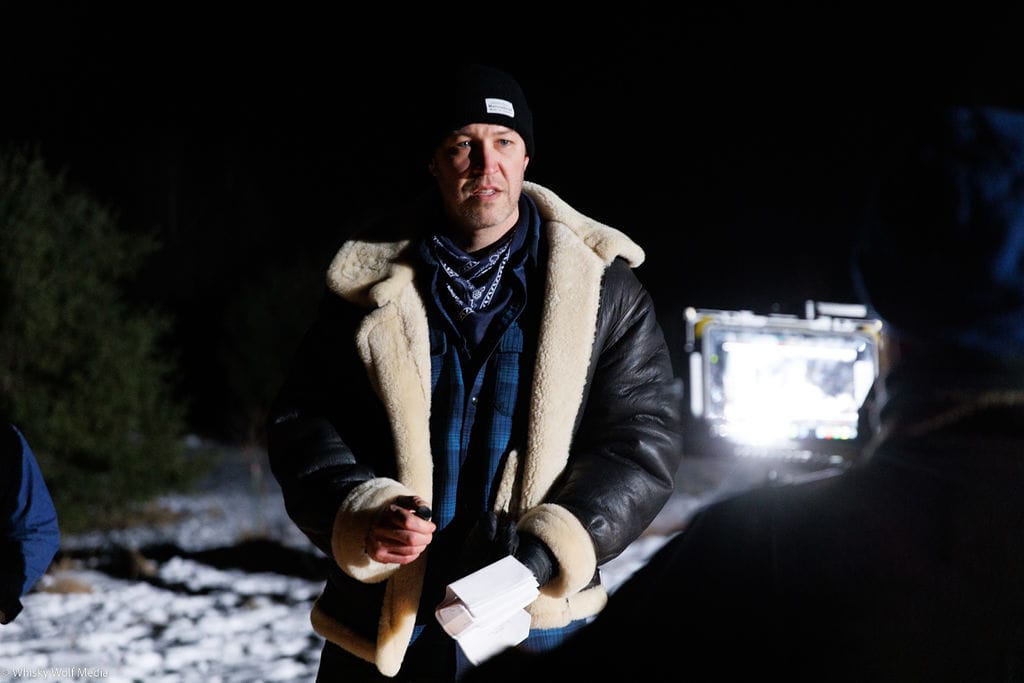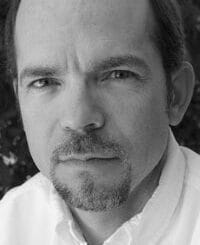David Jester
He is the filmmaker of One For The Road Dollar Baby film.
SKSM: Could you start with telling me a little bit about yourself? Who are you and what do you do?
David Jester: Oh, as simple as that question is, that is a more difficult question than you can imagine. My name is David Jester. I am New Yorker by birth and childhood, a resident of Maine for over 25 years. I was a career firefighter/paramedic for 23 years, and worked in film for the last 6 years. I am now a producer for a production company that works a hybrid model of both live stage and broadcast production.
SKSM: When did you know you wanted to become a filmmaker?
David Jester: Well, I’ve always loved film. Growing up in the 80s I wore VHS tapes watching them so much. I had one tape that I memorized all the lines on all three movies. That VHS contained Pee Wee’s Big Adventure, Goonies, and Clue. I think my obsession and need to watch movies started early on and moved into my adulthood. About 7 years ago I made a television series for local access cable called, Stay Safe. I wrote, directed, and acted the show. I worked with a great cameraman named, Pete, who didn’t just work the camera but edited the show. It was terrible, but I had a blast. I think the best was not knowing any rules, so doing it all in a way I believed it should be done. It was Indie Filmmaking at its best. That show lives on Youtube under the Brunswick Fire Department Maine. That was when I knew this was it. I had to create more.
SKSM: When did you make One For The Road? Can you tell me a little about the production? How much did it cost? How long did it take to film it?
David Jester: I was filming a documentary about two local artists, a father-son duo of artists, with another filmmaker, Leigh Doran. I had heard about the Dollar Baby Program years ago, and was fascinated with the phenomenon. We decided to put in for it. I chose a short story that I knew, loved, and really spoke to me, One For The Road. I love films about vampires –I have a feature length script about vampires just burning a hole in my hard drive– so it didn’t take long for me to choose it. Also, I love mythology, and this drew out the story of Salem’s Lot. It’s almost post-apocalyptic, right? Living on the edge of that disaster. Struggling. And, it’s before the internet and social media connection, prior to the world knowing everything. Things like that could happen, and no one would ever know.
Sorry, that was a long divergence. Where was I? We had the contract for One For The Road in 2021 and had to put it on hold for a bit as Covid numbers were spiking. We received an extension on the contract to make the film, and filmed in the winter of 2023, in the deep cold of February.
The production was great. There was so much energy on set. Everyone was so invested in the production of the film. Leigh Doran, one of the Executive Producers, was the real problem solver on set, ensuring everything worked smoothly. We were a scrappy group of cast and crew, but damn wasn’t it a good time. I cried at one point giving an interview, because I was so touched at how much heart everyone gave to this film.
Well, the production cost a lot more than the $30,000 I put down in the actuals. That was what we raised for the film. Realistically, I spent another $10 – 20,000 on the film out of my own pocket. I worked a lot of overtime and other film jobs to support the film. I’m still paying as I put the film out onto Filmfreeway. Such is the obsession with film, we do it for the love of it. It took five days to film and then a few months with the incredible editor Roger Cropley II.
SKSM: Can you tell us about your experience on this Dollar Baby film? Was everything planned ahead or did some things change during filming?
David Jester: HA! You can plan all you want, but doesn’t something always change. I read somewhere to never change during production. Stick to what you planned. Then I read somewhere that you should be fluid and change when you see the need to. Did we change things, certainly. We filmed the Marla apartment sequence first day. After seeing how incredible she was, I was thinking about putting her into the bar scene. Jamie Dicicco approached me on day three and brought up the possibility of Marla being in the bar scene. It was kismet. We both were thinking the same thing. So, we threw her in. In that same scene, when Tookey takes the pictures and throws them into Richie’s face, recalling the backstories, that was all Tookey. He created those backstories. I believe actors can bring more than just the scripted lines, as long as the intention of that scene doesn’t change. A few scenes weren’t captured as well, but that was purposely done.
I also changed a location last minute. The night of filming actually. It was perfect that we chose this new location, because Lumley’s car, which was a 1960s Mercedes, a hulk of a beast, wouldn’t start, so my father and I had to tow it with the van used in the film, to the location which was right up the road from where the car was.
SKSM: You are the director and producer of the film. What were your greatest satisfactions and challenges in these roles?
David Jester: I love all aspects of directing a film. It is my favorite role. I have a visual mind–which until recently I didn’t realize people “think differently,”–so I don’t hear my thoughts, I see my thoughts. Which is wild and good for filmmaking. I can see the film as if it’s already been made. I derive satisfaction from seeing the film begin to unfold with each scene captured.
I have to say for a film, there were few challenges. Most were logistical issues, that are boring and don’t need to be recalled. If anything, Day 2 was the most trying. All at once Lumley’s car wouldn’t run, the hotel I was putting Tana-Francey-and her family up in didn’t have their reservation–even though I had a confirmation number–and the van had an exhaust leak which was asphyxiating Jules, Ethan, and Cody. Meanwhile, I had cast and crew waiting to be shuttled to the location, while we were racing against daylight to get all of this done for a dusk shot. But, it happened, and that’s what matters.
SKSM: Were there unexpected moments or difficulties during the making of the film that have become a new point of view?
David Jester: Yes, very much so. I worked a Dollar Baby, I Know What You Need, the summer of 2021. I made a good friend on that film, Julia Marchese. She’s a director I look up to and pull a lot of energy from. I had called her for advice. Two things she said to me –I’m paraphrasing here– was spend time with the actors as the director, and this is your film, don’t compromise on it. I tried to listen to her and kept that in the back of my mind, but I still faltered at times on the, “don’t compromise.” If anything, I learned to be more meticulous, to be fastidious. I am so used to being a leader in my job. I mean, I deal with life or death situations. But here, I felt a novice. If anything, I know now to that a director should always surround themselves with people that see their vision and that are as excited to have their vision come to life on screen.
SKSM: What has this experience left you from a professional and human point of view?
David Jester: Well, I know from start to finish I can make a film, that is for damn sure. Seriously though, the need to create is strong and boils deep within me. I need that outlet for it, and film and writing is my pressure valve, my release.
SKSM: You made some changes from the original story. I personally loved it, but how do you think (or would you like) the audience to react?
David Jester: Well, I went through so many copies of that script. Ha! But, eventually, Jeff Whitehead, Producer and member of the George A Romero Foundation, signed on as executive producer, and with gentle nudging, convinced me to reduce the number of script pages. I am grateful for him in doing that; and his continuing support throughout the film and after.
You know, One For The Road isn’t really a horror story. I mean, it exists in King’s world, but it is really horror? But it always gets lumped in because it is. Originally, I was going for a more Carpenteresque, The Thing, style of film. Distrust. Isolation. Separation. That would be the feature film version I would right of this. An hour and a half version. Trust me, the other version were off the hook, but not achievable with the budget or scale. So, let me get back on topic. This is a film of people talking in rooms. Frustration. Confusion. I love the idea of this story for one reason. How do you convince someone that vampires are real, when we believe them all folktales? That’s what Tookey and Booth know that they can’t convince Lumley. Vampires do exist. Wow, again. Tangents. I want the audience to imagine themselves from all the perspectives. How each character must feel, knowing what they know.
SKSM: How did you find out that King sold the movie rights to some of his stories for just $1? Was it just a wild guess or did you know it before you sent him the check?
David Jester: I heard about this in circles decades ago. I went to the University of Maine in Orono for college in 1999. That was King’s alma mater. I saw him give the commencement speech to the class of 2005. I heard about it up there, just as rumor, and explored it later in life.
SKSM: Can you share with us any significant moment or memories that happened on set?
David Jester: It is so difficult to isolate a memory, especially when, as the director, there is so much going on. But, I have to single out Day 3. We were using flares out in the field, and Cody-Lumley-struck that flare, and goddamn did it look ethereal. I was so mesmerized by it all. So much so that I forgot that they were freezing, and eventually had to be reminded that they were freezing.
SKSM: Technology has changed a lot since the first Dollar Baby films began to be filmed. One for the road is a story in which snow is a very important factor, almost like another protagonist in the story. Did technology help with the snow or did you choose to film the scenes with real snow?
David Jester: Let me be straightforward. I hate fake snow. I hate post work. I want real. I’m not faulting other filmmakers use of it. I just like real, practical solutions. I mean, we were filming in the Downeast Region of Maine. In February. It snows a lot up here, but the weather has been changing in the last decade. So, I had my fingers crossed for some snow to be on the ground, and within the few weeks prior to filming, it finally snowed. I was so thankful to just to have some on the ground. And then, that scene. Chef’s Kiss. I could not have asked for anything more. I don’t want to spoil it, but damn that made it.
SKSM: Now the Dollar Baby program has been disbanded, do you think that an Internet or DVD release could be posible?
David Jester: No. All Dollar Baby’s are still bound to the contracts. I am a stickler for this. I agreed to terms and I will keep to them. I notice so many people putting their work up on Youtube and making it public. I just can’t do it. The contract is very explicit, and anyone who believes that any viewing publicly is ok without permission is kidding themselves.
SKSM: What “good or bad” reviews have you received on your film?
David Jester: One For The Road has received quite a bit of positive feedback. It’s won an award, been nominated at festivals. It has a good acceptance rate so far. Most criticisms have come from friends and associates who knew my original intention for the film, prior to cutting down the time. They don’t have poor feedback, but just feel that my original film idea was X and I came out with Y. Not bad, but just the intention of it was different. Which is something I agree with. Again, give me $250k, and remake that film into something! But hey, isn’t that what all filmmakers want, funding.
SKSM: Do you plan to screen the movie at a particular festival?
David Jester: Yes, but I don’t know if I can say yet. More to come on that.
SKSM: Do you have any plans for making more movies based on Stephen King’s stories? If you could pick -at least- one story to shoot, which one would it be and why?
David Jester: As of right now, I do not have any plans on making more Stephen King movies. I have a script I just finished I’m sending out, and I’m working on another. I am always writing scripts. I finish them, I put them away. Who knows what will come of them.
I would go back and reshoot One For The Road. Definitely. Hands down. No doubt about it. Can’t say it enough. I would dust off the 40 page script, expand on it, and make it into the film I so desire.
SKSM: What are you working on nowadays?
David Jester: That is question that plagues me everyday of my life. Everything. Nothing. Everything. I am trying to decide and focus my energies into one project. I have a passion project that I really want to shoot, but there is another script in my mind that I cannot let go ot, so I am writing it. Tweaking it. Storyboarding it. We’ll see. You never know what comes of work. Does it involve Vampires? Yes. Does it involve people talking in rooms? Yes. Does it involve murder, intrigue, and comedy? Yes. And a mansion. That is key. Always need a mansion.
SKSM: What one thing people would be surprised to know about you?
David Jester: The TV show that I mentioned, Stay Safe, weirdly enough was picked up in 33 different states on public access channels. Actually showed in Washington DC and Fairbanks, Alaska. I still can’t get over that. Is that really about me? Ok, something that would surprise someone to know about me…
I feel you want to know a feat or deficiency. OK. Here’s one. As accomplished as I am, I cannot, for the life of me, whistle. It is unbelievably frustrating. My father can do that two finger whistle, that’s so shrill and sharp it echoes through your mind for minutes. Me, nope. No whistling. I can loon call with the best of them, but not a single whistle. I’ve given up trying at this point.
SKSM: Thanks for taking the time to answer my questions. Is there anything you want to say to the fans that read this interview?
David Jester: There is definitely more to the film than just the director, and without the passion brought by everyone on set, this film wouldn’t have been the same. The location was graciously donated. The crafty and F & B was made and delivered by my parents. My brother donated the use of a car. The use of the van was donated by another business, Jim’s Auto. I mean, the list goes on. The contributors to the film. What I’m getting at is, I am forever grateful for every person and business that gave their time. It is the best feeling in the world to be supported, and that is what this film received, support. And to you all, thank you for taking the time to read this. Until the next film. Stay Safe.

















